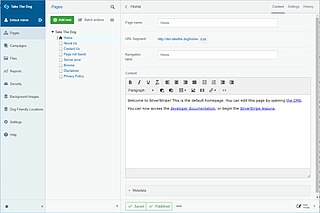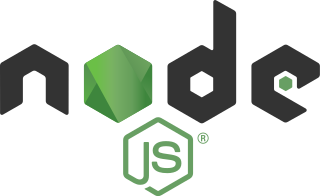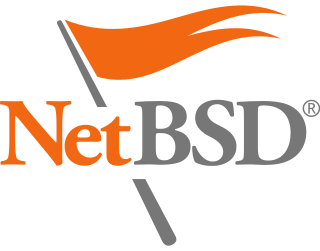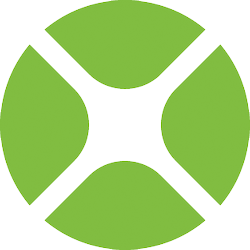In computing, cross-platform software is computer software that is designed to work in several computing platforms. Some cross-platform software requires a separate build for each platform, but some can be directly run on any platform without special preparation, being written in an interpreted language or compiled to portable bytecode for which the interpreters or run-time packages are common or standard components of all supported platforms.
A computing platform, digital platform, or software platform is an environment in which software is executed. It may be the hardware or the operating system (OS), a web browser and associated application programming interfaces, or other underlying software, as long as the program code is executed using the services provided by the platform. Computing platforms have different abstraction levels, including a computer architecture, an OS, or runtime libraries. A computing platform is the stage on which computer programs can run.
In software engineering, a compatibility layer is an interface that allows binaries for a legacy or foreign system to run on a host system. This translates system calls for the foreign system into native system calls for the host system. With some libraries for the foreign system, this will often be sufficient to run foreign binaries on the host system. A hardware compatibility layer consists of tools that allow hardware emulation.

DTrace is a comprehensive dynamic tracing framework originally created by Sun Microsystems for troubleshooting kernel and application problems on production systems in real time. Originally developed for Solaris, it has since been released under the free Common Development and Distribution License (CDDL) in OpenSolaris and its descendant illumos, and has been ported to several other Unix-like systems.
In computer security, a sandbox is a security mechanism for separating running programs, usually in an effort to mitigate system failures and/or software vulnerabilities from spreading. The isolation metaphor is taken from the idea of children who do not play well together, so each is given his or her own sandbox to play in alone. It is often used to execute untested or untrusted programs or code, possibly from unverified or untrusted third parties, suppliers, users or websites, without risking harm to the host machine or operating system. A sandbox typically provides a tightly controlled set of resources for guest programs to run in, such as storage and memory scratch space. Network access, the ability to inspect the host system, or read from input devices are usually disallowed or heavily restricted.

TrueOS is a discontinued Unix-like, server-oriented operating system built upon the most recent releases of FreeBSD-CURRENT.
The following tables compare general and technical information between a number of notable IRC client programs which have been discussed in independent, reliable prior published sources.
TrueNAS is the branding for a range of free and open-source network-attached storage (NAS) operating systems produced by iXsystems, and based on FreeBSD and Linux, using the OpenZFS file system. It is licensed under the terms of the BSD License and runs on commodity x86-64 hardware.

Silverstripe CMS is a free and open source content management system (CMS) and framework for creating and maintaining websites and web applications. It provides an out of the box web-based administration panel that enables users to make modifications to parts of the website, which includes a WYSIWYG website editor. The core of the software is Silverstripe Framework, a PHP Web application framework.
The Killer NIC, from Killer Gaming, is designed to circumvent the Microsoft Windows TCP/IP stack, and handle processing on the card via a dedicated network processor. Most standard network cards are host based, and make use of the primary CPU. The manufacturer claims that the Killer NIC is capable of reducing network latency and lag. The card was first introduced in 2006.
An AES instruction set is a set of instructions that are specifically designed to perform AES encryption and decryption operations efficiently. These instructions are typically found in modern processors and can greatly accelerate AES operations compared to software implementations. An AES instruction set includes instructions for key expansion, encryption, and decryption using various key sizes.

Node.js is a cross-platform, open-source JavaScript runtime environment that can run on Windows, Linux, Unix, macOS, and more. Node.js runs on the V8 JavaScript engine, and executes JavaScript code outside a web browser.

li₃ is a full-stack web framework, for producing web applications. It is written in PHP and is based on the model–view–controller development architecture. It is described as adhering to no-nonsense philosophies.

NetBSD is a free and open-source Unix operating system based on the Berkeley Software Distribution (BSD). It was the first open-source BSD descendant officially released after 386BSD was forked. It continues to be actively developed and is available for many platforms, including servers, desktops, handheld devices, and embedded systems.

Flask is a micro web framework written in Python. It is classified as a microframework because it does not require particular tools or libraries. It has no database abstraction layer, form validation, or any other components where pre-existing third-party libraries provide common functions. However, Flask supports extensions that can add application features as if they were implemented in Flask itself. Extensions exist for object-relational mappers, form validation, upload handling, various open authentication technologies and several common framework related tools.

Pale Moon is an open-source web browser with an emphasis on customization; its motto is "Your browser, Your way". There are official releases for Microsoft Windows, FreeBSD, macOS, and Linux, as well as contributed builds for various platforms.

The Xojo programming environment and programming language is developed and commercially marketed by Xojo, Inc. of Austin, Texas for software development targeting macOS, Microsoft Windows, Linux, iOS, Android, the Web and Raspberry Pi. Xojo uses a proprietary object-oriented language.

PeachPie is an open-source PHP language compiler and runtime for the .NET Framework and .NET. It is built on top of the Microsoft Roslyn compiler platform and is based on the first-generation Phalanger project. PeachPie compiles source code written in PHP to CIL byte-code. PeachPie takes advantage of the JIT compiler component of the .NET Framework in order to handle the beginning of the compilation process. Its purpose is not to generate or optimize native code, but rather to compile PHP scripts into .NET assemblies containing CIL code and meta-data. In July 2017, the project became a member of the .NET Foundation.
FastAPI is a modern web framework for building RESTful APIs in Python. It was first released in 2018 and has since quickly gained popularity among developers due to its ease of use, speed and robustness.








